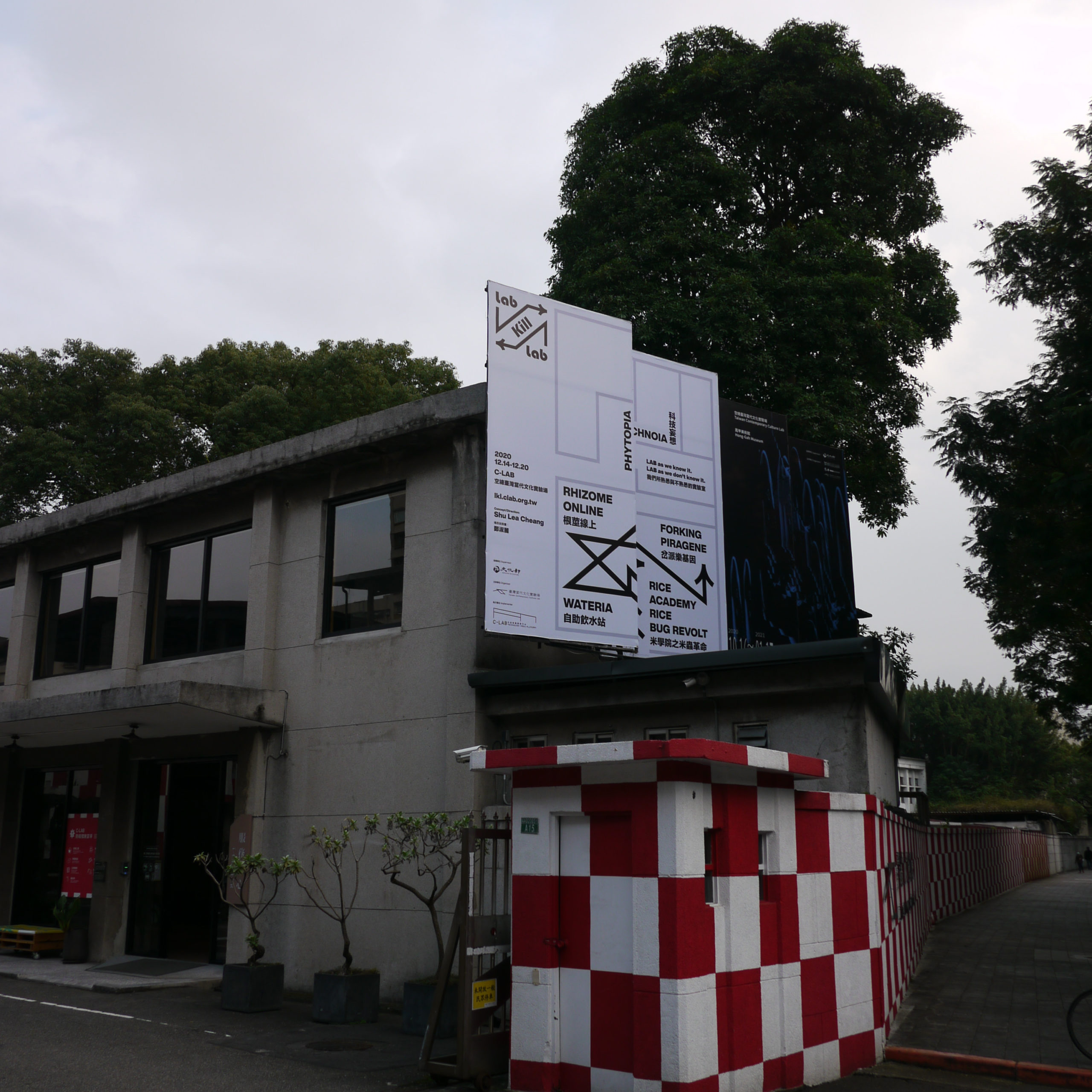by Tyng-Ruey Chuang
語言:
English
Photo Credit: Tyng-Ruey Chuang
THE LAB KILL LAB project concept aims to “permit a well-defined working lab the possibility to be renewed, substituted, replaced, regenerated and retired as time progresses”. The concept is exemplified and laid out as five “work stations” at C-LAB in Taipei from the week of December 14 to December 20, 2020. C-LAB is short for Taiwan Contemporary Culture Lab, a space which is managed by a foundation under the auspices of Taiwan’s Ministry of Culture.
LAB KILL LAB represents itself as a collection of participatory projects. The planning, ongoing, and fading of LAB KILL LAB projects occurs online and/or on-site. Visitors to the C-LAB campus nevertheless get to experience in person the lab works, along with the associated forums and performances. Taiwan is one of the few singular places where cultural events carry on as usual in the current pandemic. As of this writing, Taiwan has 700 plus confirmed COVID-19 cases out of a population of 23 million. Shu Lea Cheang (鄭淑麗), directing LAB KILL LAB remotely with a local team at C-LAB, emerged just in time from her fourteen-day quarantine to be on-site with the week-long event.
There are various modes of participation to LAB KILL LAB. The easiest is to visit the five online labs at the C-LAB website. Each lab is briefly introduced in two languages: English and Traditional Chinese. At the end of the introduction, a link will bring visitors to the various ongoing projects of the lab where project proposals, collaborators, field notes, schedules, etc. are in flux. Project ideas and works are developed publicly. In a sense, visitors are all invited to observe and participate. Indeed, the project pages themselves can be edited online.
While writing this review, I actually did some edits to PHYTOPIA, one of five labs in LAB KILL LAB. The lab’s project pages were missing English titles so I fixed them. By doing so, the line between lab works and their descriptions is burred, metadata is mixed with data, and I am a happy person transitioning from an observer to a participant. Is this what LAB KILL LAB is about? I would think so.
The PHYTOPIA lab conducts its field works not in C-LAB but in Pinglin (坪林), New Taipei City, and in Tongmeng (銅門), Hualien County. The lab is investigating “cross-species phytopolitics” with participatory field works as well as re-telling performances in and out of the fields. The collective lab works are led by two teams of indigenous knowledge/culture workers. They plan to report back on December 20 at C-LAB. The lab’s work schedules are available online, and there are open calls for discussion and participation.
Members of the WATERIA lab consist of field recording and sound artists, marine biology researchers, water/soil chemicals specialists, and environmental activists. They are sampling the water of the Datan (大潭) algal reef along the Taoyuan coastline. Chemical levels of the water samples are viewed as datasets and converted into soundtracks to be mixed with other environmental elements. This act of transdisciplinary collaboration is to call for people’s attention to the ecological impact by the impending construction of a new port at the studied site. A collective audiovisual performance is scheduled in the evening of December 18 at the C-LAB Dome, a 12-meter structure.
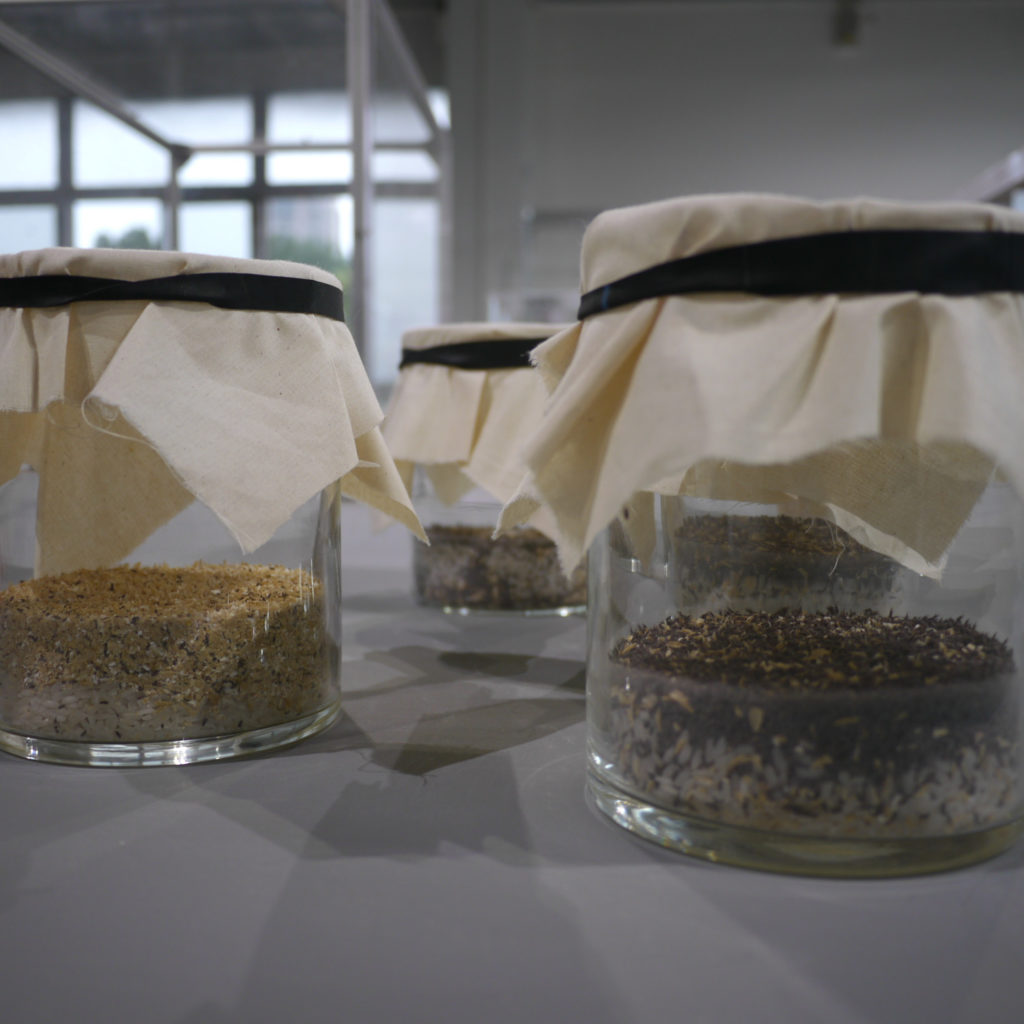
Jars of Rice Bugs Ready to Revolt. Photo credit: Tyng-Ruey Chuang.
Another diverse ensemble of agriculture researchers, rice growers, soft/hard/cook ware makers, with the help of some artists, are determined to make rice bugs sing. The plan is to detect, measure, and convert into sounds the vibrations of the rice bugs when they are eating their ways out of the seed kernels. In order to realize all this, the RICE ACADEMY Rice Bug Revolt lab needs to cultivate 100,000 rice bugs. After reading the lab’s meeting note (very detailed), I can only be awed of the scale of this operation.
Lab TECHNOIA is led by three artists working in new media, sound installations, and experimental performances. The focus is on “technologies of sensuality, sensoriality and corporality”. They organize workshops for women (and woman-identified queers) who are working on or interested in electronic media and/or sound technologies. There has been an open call for workshop participants. The workshops are held during the LAB KILL LAB week at C-LAB with a final presentation/performance on December 19, 2020.
In the lab overviews above, no name is named. I don’t tell you who the curators are and who proposed the projects. A great multitude of people have been involved in organizing the many projects in LAB KILL LAB. If I am to highlight a few names, then the other one hundred names and more will have to be omitted. As stated in the first message sent out by the LAB KILL LAB mailing list, there are 122 members on the list. This number no doubt will increase as the projects progress. Ongoing project notes of the five labs are hosted on hackmd.io for collaborative editing. You don’t need to apply for an account just to add your edits. Participation to LAB KILL LAB, more or less, wants to be fluid and equal.
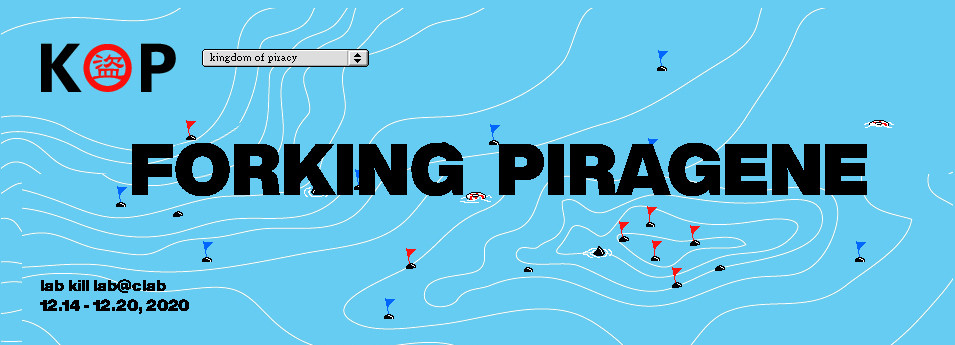
Forking PiraGene from Kingdom of Privacy. Photo credit: Shu Lea Cheang.
I need to name names, however, for Forking PiraGene. The projects in the lab are “forks”—a nerd term for derivations—of the project concept PiraGene developed by Autrijus Tang and Ilya Eric Lee in 2001 and curated in the collection Kingdom of Piracy by Shu Lea Cheang, Armin Medosch, and Yukiko Shikata. Being a passionate advocate and practitioner on multiple fronts, Shih-Chieh Li (李士傑) a.k.a. Ilya has been a hub connecting diverse communities in Taiwan and worldwide. Audrey Tang (唐鳳), the current Digital Minister of Taiwan, was formerly known as Autrijus Tang. Tragically, Ilya unexpectedly died in 2018 at the age of 47.
Forking PiraGene is a homage to Ilya’s works and, for many who knows him, a collective act of remembrance. The ideas in the original PiraGene were to parallel genetics with identities, and to construct stories of freedom and restriction. The ideas are certainly not lost in this era of viral threats and digital surveillance. There are five projects on these themes on-site at C-LAB and another five from the Rhizome online edition. I made a difficult decision to review just two of them.
Project forkonomy() plans to incite dialogues about the commons and ownership. The name forkonomy() takes its form from fork(), a standard function in system programming. A call to fork() will spawn a new process based on the existing one. In this project, the South China Sea is to be used as a conceptual ground for debates. Should water in the sea be measured by the volume and individually owned? Should ocean passages be freely traded, for example? Discussions about this are hosted at on-site workshops and online forums.
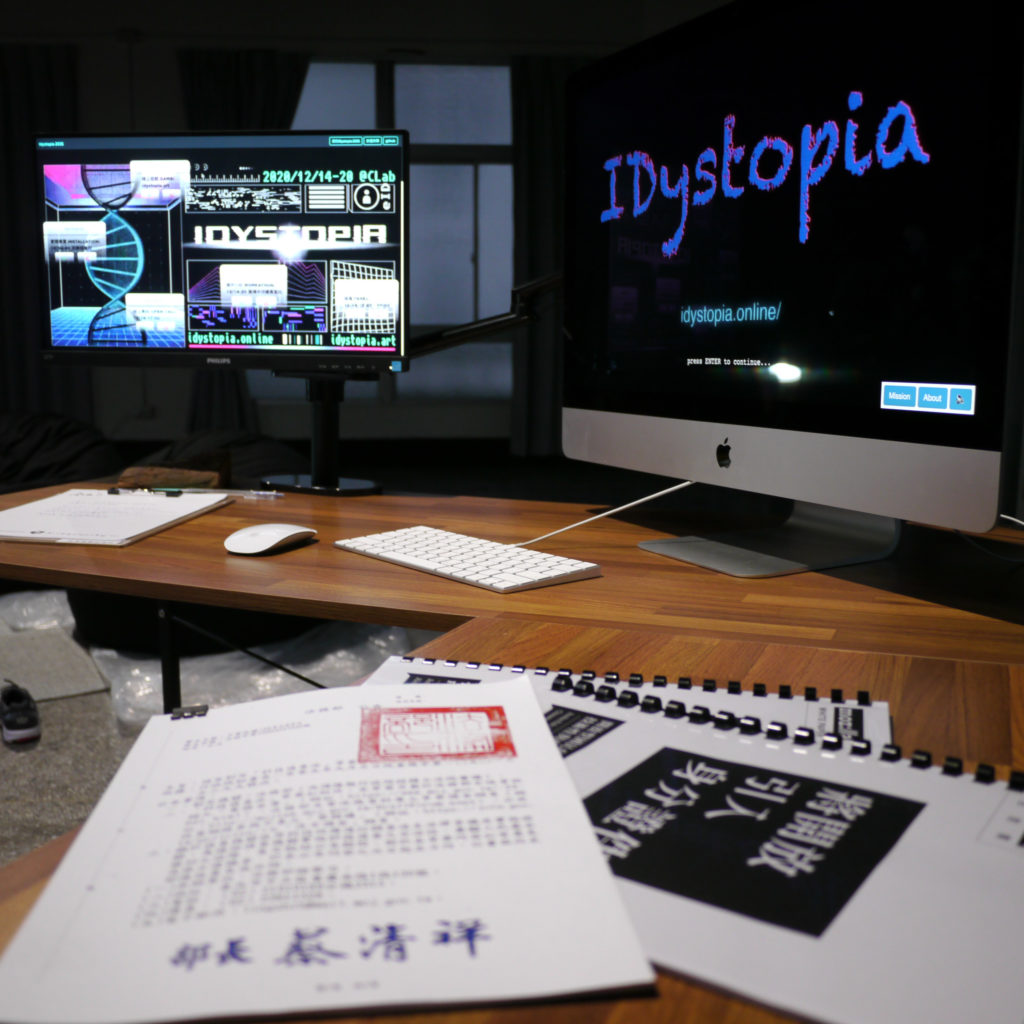
IDystopia 2035, a project in Forking PiraGene. Photo credit: Tyng-Ruey Chuang.
Project IDystopia 2035 looks at the increasingly centralized digital identity systems nowadays and uses online games to help explore future scenarios. The game has been developed by way of hackathons and virtual gatherings. The project is led by key members of g0v—a wordplay on gov—a grassroots civic tech community in Taiwan. Audrey Tang was a g0v co-founder before becoming the Digital Minister of Taiwan. The Taiwanese government’s imminent implementation of a chip-based digital identity system, built on top of the compulsory National IDs, provides a non-fictional context to this project. IDystopia 2035 has a dedicated website at idystopia.art with detailed project information (design documents, code repositories, workshops and forums, etc.)
LAB KILL LAB occupies a spacious two-storey library building at the C-LAB campus (Art Space II, Building 09). When I visited it in the afternoon of December 13, five working areas in the building were being set up for the labs. Equipments were spread on the desks, a ham radio antenna got installed, and jars of rice bugs were right there. An air of excitement, with some uncertainty, unmistakably circled at the place. To be on-site with people you may or may not know, and to try your hands on things you are not so sure about, still is the mode to go for lab works, I think.
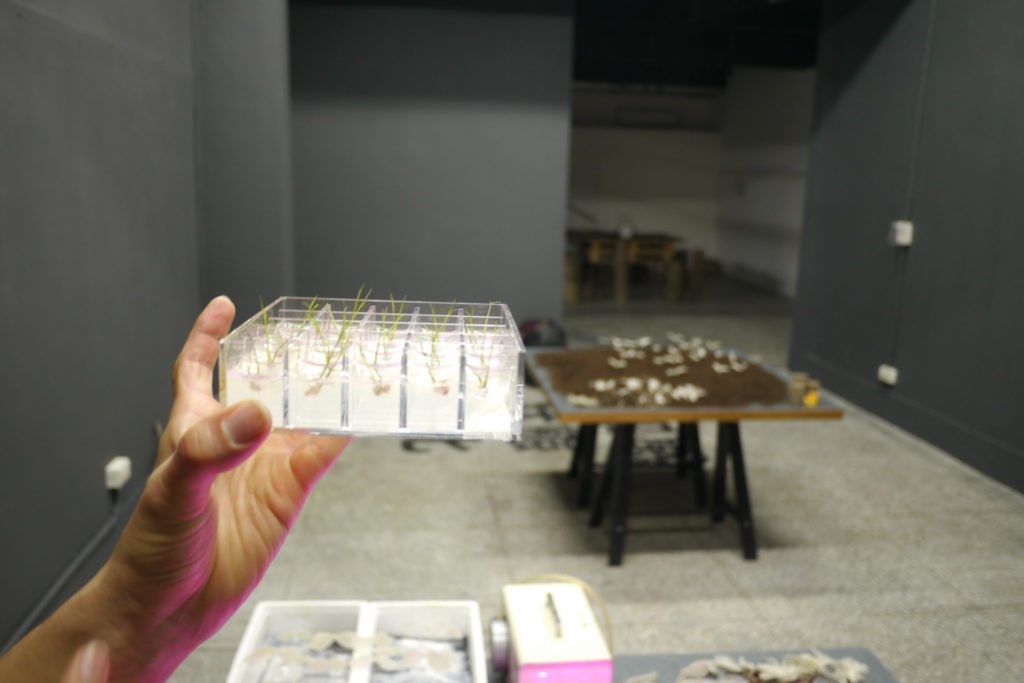
Discomfort/State/Changing by Ryu Oyama (大山龍), a project in Forking PiraGene. Photo credit: Tyng-Ruey Chuang.
During the LAB KILL LAB week at C-LAB, lab collaborators can take part in KITCHEN SOCIAL ACT, nightly held at the venue for participants to cook and share food by and for themselves. Every night has a theme and is organized differently. Some people bring in plants and mushrooms they grow themselves. Some ingredients shall come from lab works or personal experimentations. Making beer from rice, for example, will be a story I am eager to hear.
Also of particular interest to me is the way LAB KILL LAB chooses to use software tools and web services for their works. It is a nice surprise to know all projects notes are on hackmd.io, a low-barrier wiki based on Markdown; hence it can be collaboratively edited. The software behind hackmd.io is open source. GNU Mailman is used for the mailing list and Jitsi is used for video streaming and conferencing. Both are free software. For cloud storage, LAB KILL LAB uses Nextcloud which is free software as well. I cannot remember the last time I seen a large Taiwanese art/culture project embraced free software as much. (It is also worth mentioning LAB KILL LAB took care to get a proper domain name to start it all: lkl.clab.org.tw).
The LAB KILL LAB week shall prove to be a rare and memorable occasion, at least in the cultural scene of Taipei, for people for whom collaborative experimentation is central to the works they do.


